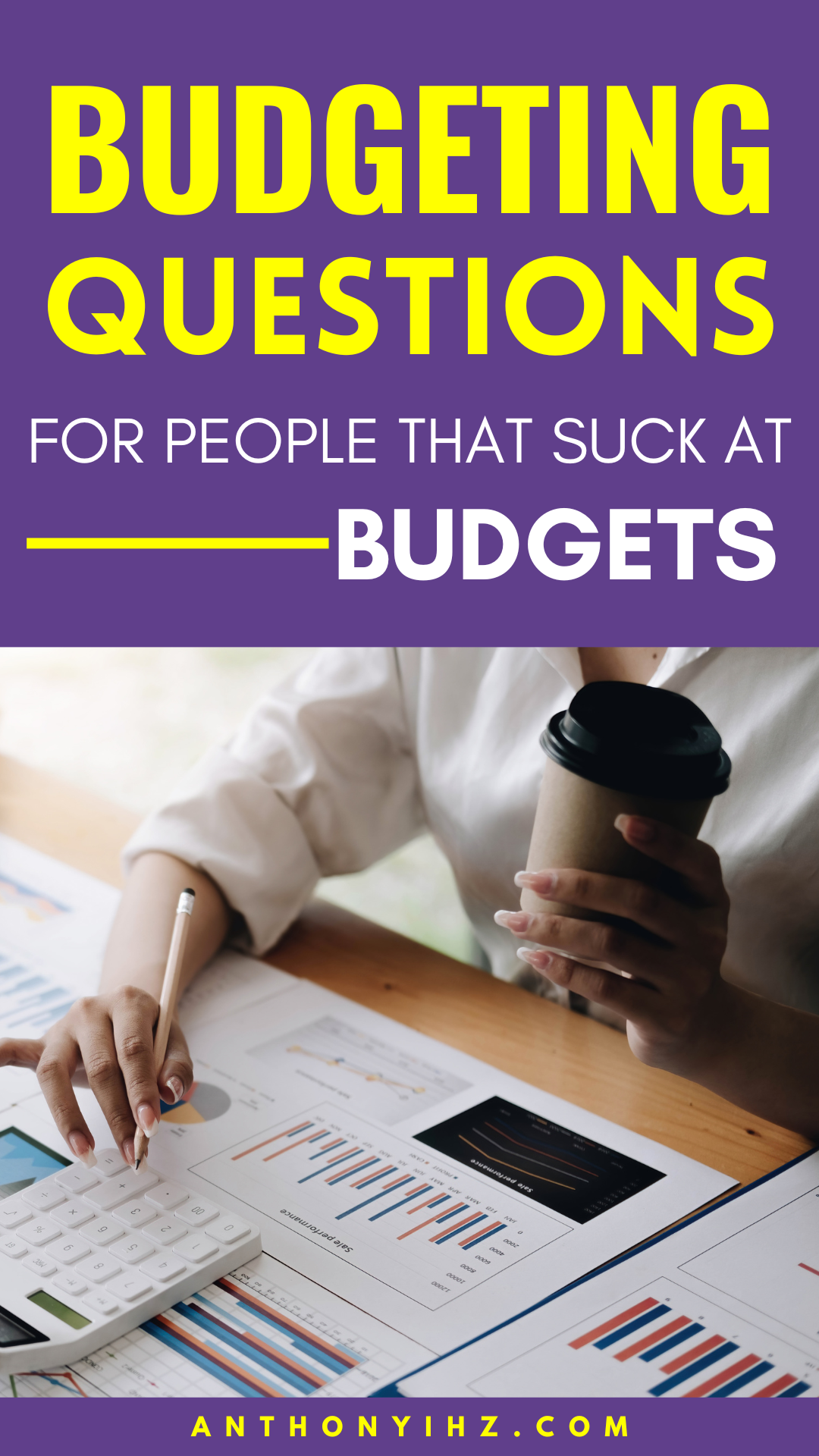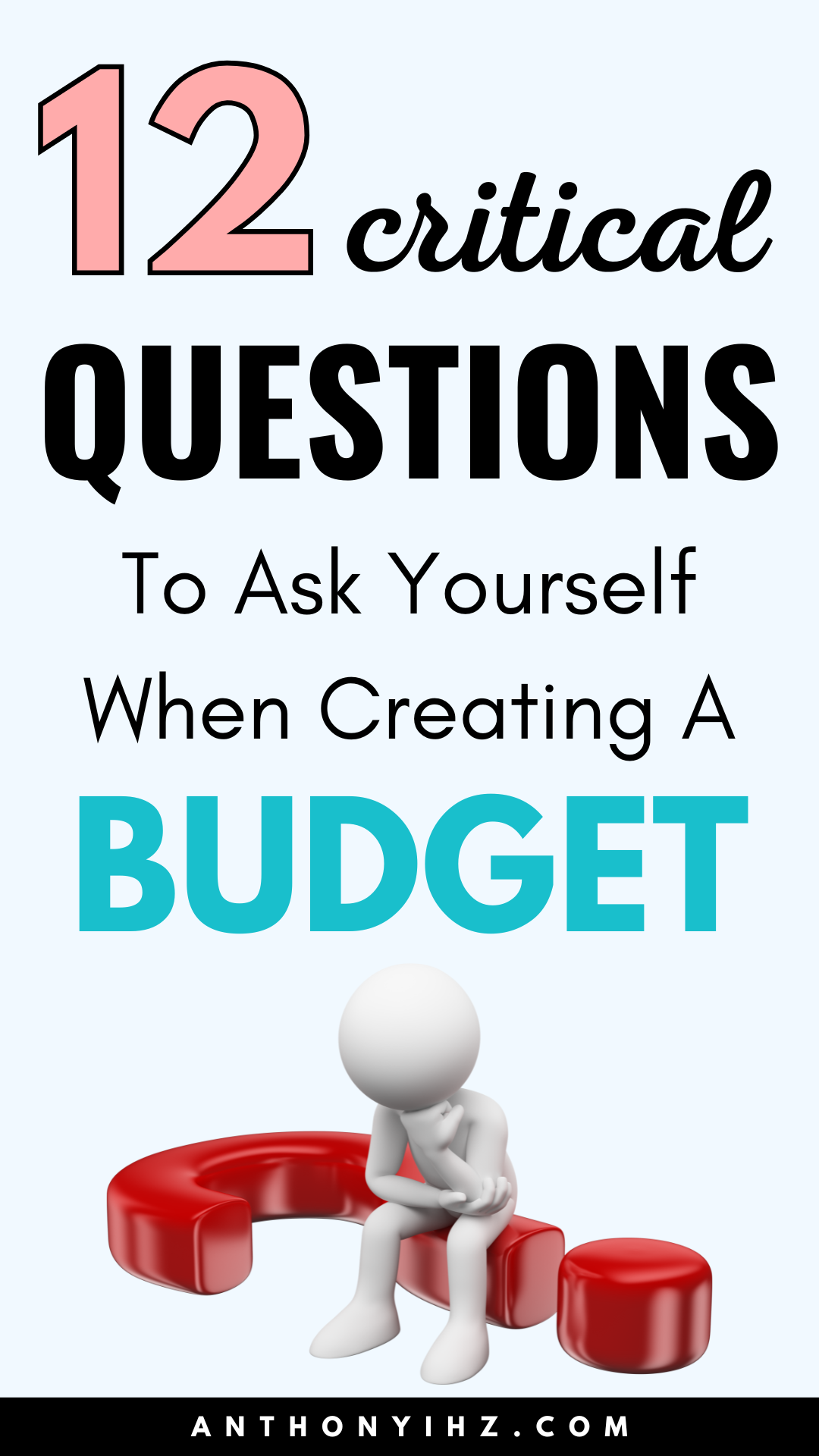
Budgeting is one of the essential personal finance habits you must adopt. Budgeting is for all classes. Whether you are extremely rich, slightly rich, or simply trying to manage your salary every month, you need to budget your income in order to keep your finances afloat. But more importantly, there are certain key budget questions you need to ask yourself when budgeting your hard-earned money.
These questions are important since they spur you to assess your budgeting strategy. Also, until you ask yourself these budget questions, you may never identify the things you often do wrong when building a budget. This post will examine these questions and also provide insight into how they are relevant to your personal finance.
Why Do You Need A Budget?
One major reason why you need a budget is to organize your expenses and curb your spending habit. Since you tend to spend money on only the bills you have budgeted for, chances are that you won’t overspend.
Budgeting also helps you to keep track of your spending. If you consistently budget your salary and spend wisely, it would be easier to track your expenses within the last 3 months. This is because you have everything on record – your budget.
Does Building A Budget Improve Your Finances?
Building a budget definitely improves your financial situation. For example, since a budget can help you curb your spending, this means you can save extra money toward your financial goals or possible investments in the future.
How To Build A Budget
Building a budget is not a complex job that takes hours and a lot of effort to complete. If done right, budgeting shouldn’t give you a headache. Here are 6 simple steps to budget your money:
Determine Your Net Income
You shouldn’t talk about budgeting until you have calculated your net income. This is your take-home pay every month. How much do you have left after paying taxes and making payments for employer-provided programs such as health insurance and retirement plan?
You must determine your net income rather than focus on your salary. That’s the starting point to building a budget and managing your finances.
Track Your Expenses
Another important thing that must be done when budgeting is tracking your expenses. This may be a little difficult, especially if you haven’t budgeted your income before. Notwithstanding, categorizing your expenses and identifying your spending is a good place to start.
Usually, you should begin by listing all your fixed expenses. These are regular bills you have to pay unfailingly, and they include rent, utilities, mortgage, etc.
The next thing is to list your variable expenses. These are bills that don’t have fixed prices on them. They change from month to month, and they include groceries, entertainment, and other secondary expenses.
Once this aspect has been settled, you can clearly see what you have to spend your income on. Based on your personal goals, you can choose to reduce these expenses to save extra money.
Set Feasible Goals
Your budget should be connected to realistic goals. They can either be short-term or long-term goals. You can choose to build an emergency fund, pay off credit card debt, or set up a retirement fund. These are good financial goals that you need to pursue. However, ensure that your budget enables you to conveniently go after these goals without compromising other essential expenses.
Create A Plan
This is a critical stage in building a budget. It’s where you bring everything together: your impending expenses vs. what you actually want to spend. Using the list of fixed and variable expenses, you can get an idea of what you are likely to spend in the coming months. Then, it’s time to create a plan by setting specific and realistic spending limits for each category of expenses.
This also means you need to focus more on your essential expenses rather than pay attention to what you don’t necessarily need. This is how to execute a budget successfully.
Adjust Your Spending To Stay On Track
Having documented your expenses and understood your net income, you might need to make adjustments to certain parts of the budget. The goal is to prevent yourself from overspending. Examine your “wants” and figure out a way to reduce your spending. Doing this is vital as it makes your budget more realistic and achievable. Also, it’s a brilliant way to live below your means.
Review Your Budget Regularly
Once you have finished building your budget, there’s nothing else to do but to watch yourself stick to the budget and curb your spending. However, there’s a need to review your budget regularly and ensure that you are on track. For example, if a particular bill, maybe your rent, is increased by your property owner, you would have to review your budget to cater to that need.
If you don’t want to take out more money from your checking account to complete the rent, you may want to cut down on some minor expenses to balance it up. That’s how you win financially with your budget.

12 Questions To Ask Yourself When Building A Budget
To build a budget more effectively, here are some vital questions to ask yourself:
1. What Is My Income?
This is one of the most important budgeting questions to ponder. If you don’t know how much you make every month, how can you budget your income? It’s practically impossible.
Whether you work a white-collar job or operate your own business, calculate your monthly earnings to see how much money sits in your checking account (after taxes, of course). Once you determine your monthly income, that’s the foundation upon which you will begin to build a budget.
2. Do I Have Debts?
Debts can deprive you of spending your hard-earned money the way it’s supposed to be spent. When there’s a huge chunk of debt to pay off, you won’t be able to chase other essential financial goals. Building a budget would even prove difficult because you won’t be able to always meet all your financial obligations.
Hence, it’s important to know how much you have in debt. Then you can start working toward paying it off gradually every month. This means you would include debt in your budget as one of the basic expenses you must settle every month.
Always remember that budget questions about debt are important things to consider.
Besides, if you want to learn about some of the best-known strategies for paying off debt, check out these 10 helpful tips to speed up your debt repayment time.
3. What Are My Expenses?
One of the critical budget questions you shouldn’t neglect is this – finding the list of fixed and variable expenses. Itemize your bills and also specify how much you need to spend. This is almost the entire blueprint for building a budget.
Once you can determine your monthly expenses, you can now go ahead and compare them with your take-home pay. If your expenses exceed your income, then you have some work to do. You would have to cut your living costs until your budget is realistic.
4. How Much Have I Spent In The Last 3-6 Months?
Before you build a budget, this is one of the top budgeting questions to ask yourself. You should try to get a record of your previous expenses. Within the last 3-6 months. This is important since you need to determine if you have been overspending or not.
One of the main reasons for building a budget is to curb overspending and impulse purchases. So, if you happen to realize that you spent more than you should, you need to adjust immediately as you begin to build a budget.
5. What Are My Fixed Expenses?
Your fixed expenses are expenses such as rent, utilities, gas, water bill, and other related expenses. Since these bills must be paid regularly, you have to prioritize them over your “wants”. These are the expenses that your budget should plan for before other things. You can decide to budget some money for secondary expenses such as recreation or entertainment after you must have settled your fixed bills.
6. Am I Prepared For Emergencies?
This is one of the budget questions you should remind yourself of. You won’t always have financial stability without any challenges. Even millionaires sometimes have to face financial difficulties. This is why it’s important to prepare for emergencies by building an emergency fund.
You could lose your job, get involved in an accident, or fall ill. There should be a financial plan for you to fall back on during emergencies such as these.
Usually, an emergency fund is expected to cover 3-6 months of your basic expenses. That could be enough time for you to recover from your financial crisis and stabilize your finances once more.
By the way, if you need help preparing for emergencies, here’s a post explaining the 7 steps to building an emergency fund.
7. What Are My Financial Goals?
Saving for retirement, planning to start a new business, or getting out of credit card debt are valid financial goals you could look forward to achieving. Budgeting can be used as a tool to help you accomplish any of these goals faster.
When you reduce your spending and maximize your savings, you will be able to raise enough amount of money to hit your goals. Ensure every dollar you spend counts. Don’t be quick to indulge in impulse buying, forgetting your main objective of curbing your spending.
8. What Do I Do With The Leftover Money?
One of the questions to ask yourself when building a budget should be about the leftover money after budgeting for your basic expenses. Some people believe this remaining amount of money should be spent on irrelevant things, especially on entertainment.
However, if you are goal-driven and care about improving your financial situation, the extra money from your budget should be put toward your financial goal. If you don’t have any significant goal or objective to spend money on, then you should simply save your money in an investment account.
9. What Are My Priorities?
This is one of the many budget questions to think about all the time. How do you prioritize your financial needs? Would you rather save money for a new car than repay your student loan debt? Anyone willing to make the right financial decision would certainly pay off the debt before thinking about buying a car outright or accepting a car loan.
You need to list your priorities accordingly and double down on the most crucial goals. That’s how you make progress.
10. Where Can I Improve My Budget?
Finding time to improve your budget occasionally is an effective way to remain on track. Hence, this is one of the questions about budget you must answer honestly. Improving your budget means you may need to make some necessary adjustments in the future to keep the budget functional.
This is often determined by your expenses or your cash flow. For example, if your fixed expenses increase, you would have to adjust your budget to accommodate the bills. On the other hand, if your income increases, you may be promoted to allot more money to certain categories of expenses in your budget.
11. Was My Previous Budget Successful?
If you have budgeted previously, this is one of the budget questions to consider. Building a budget for the first time or the first few times won’t guarantee splendid results. However, there should be some notable highlights and successes.
Examine your previous budget and find out how to make your current one much better. All the wrong things you did in your previous budget can be corrected when building the current one. Also, all the things you did right can be improved on in the current budget.
12. How Can I Make My Budget Stable?
One of the typical budget questions to ask yourself is how to stabilize your working budget. As of today, it’s not uncommon to find people who used to budget their income regularly but stopped all of a sudden. A good explanation for why this happens is that these folks are unable to keep their budget stable for as long as possible.
Maybe at some point, they gored bored of taking a pen and paper to write out their expenses and budget for them.
Due to the availability of budgeting apps, you can overcome this challenge. Most budgeting apps are free, allowing you to build a proper budget with a few clicks on your mobile phone. These apps make it easy to track your spending and monitor your progress. It also reminds you to make certain payments, especially toward your financial goals.
Basically, using a budgeting app makes the whole process easy and hassle-free.
Questions To Ask When Building A Budget: Final Thoughts
These budget questions briefly discussed can reshape your mindset about budgeting and also open your eyes to ideas you were oblivious to. As you ponder on these questions, don’t hesitate to improve your budgeting strategy with the insights you derive.
Moreover, if you are not used to budgeting, don’t expect to grasp the whole concept and build a perfect budget on your first try. That would probably not happen. However, acknowledging your progress is important. You will keep getting better when you do that.
Pin this for later!


